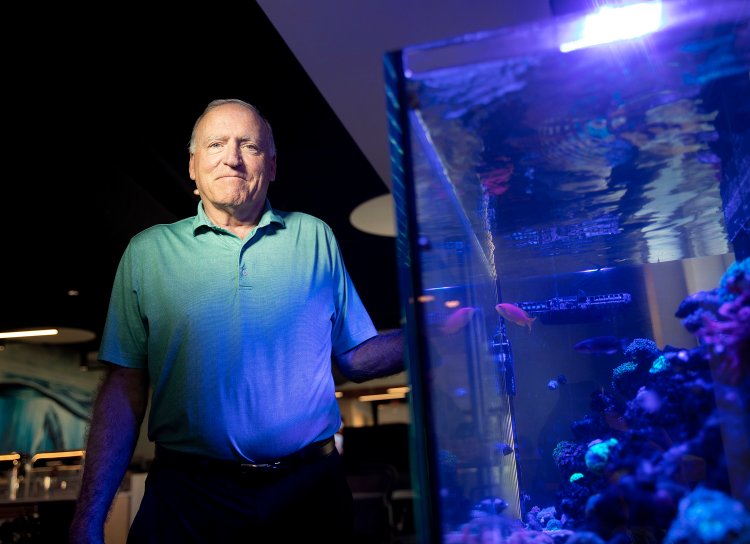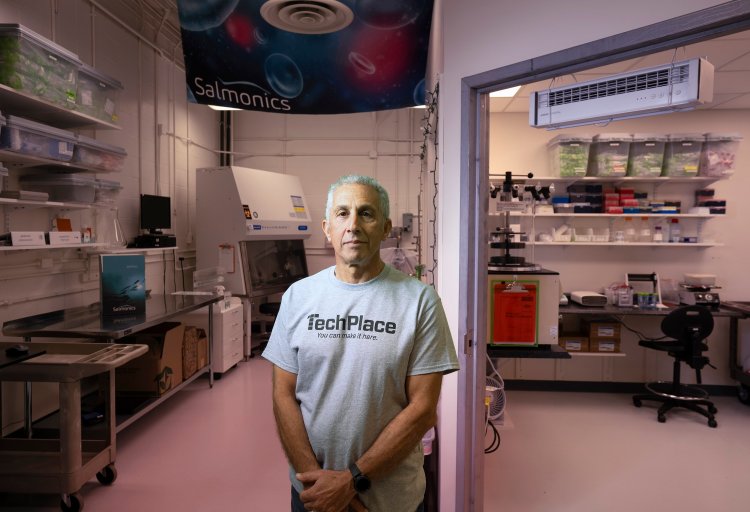

Matthew Hoffner, an entrepreneur in residence at Maine Technology Institute, is working to attract proposals for a co-working wet laboratory to help startup businesses grow their companies in Maine, rather than move to Boston. (Derek Davis/Staff Photographer)
Matt Hoffner has seen too many of Maine’s promising life science startups leave the state to grow their companies.
Entrepreneurs in the burgeoning industry reach a point where they’ve developed their idea and need to test it out in a laboratory equipped to handle liquids, chemicals and biological samples. But with equipment alone carrying a price tag of up to $1 million, they can’t finance that themselves and Maine doesn’t have the infrastructure – shared laboratory space for rent – to meet their needs.
So they head south to Boston, where these co-working “wet lab” spaces abound.
“It’s a killer to watch these young companies leave,” said Hoffner, an entrepreneur in residence at Maine Technology Institute, a publicly funded nonprofit dedicated to growing technology-intensive companies in the state.
‘THE NEXT GENERATION OF INNOVATION’
A new initiative from the state and MTI seeks to not only keep these startups in the state but also attract new ones by creating the state’s first life sciences incubator, likely in Greater Portland.
The new facility “would launch and scale the next generation of life sciences startups by bringing together expert science mentors, workforce development programs and investors to support entrepreneurs in efficiently growing their companies in Maine,” the governor’s office said in a news release.
It would be equipped with all the technology the startups need: a spectrophotometer to measure how much a chemical substance absorbs light, various microscopes and cryotanks, a deep freezer, centrifuges and more.
Agnieszka Carpenter, executive director of the Bioscience Association of Maine, said wet lab space is the “foundational element” of the life sciences ecosystem.
“Establishing a dedicated incubator will help fuel the momentum we’re already seeing in Maine’s growing biotech sector and support the next generation of innovation,” she said.
There are a few other small wet labs in Maine, like BioPilot/BioIN at Northeastern University’s Roux Institute, but according to Hoffner, they lack the full range of services that a true commercial wet lab provides, such as purchasing services, waste disposal, class A office space and meeting rooms.
Last week, MTI released a “request for proposals” to build the laboratory with the help of a $2.75 million grant – $2 million of federal funding through the Governor’s Maine Jobs & Recovery Plan and $750,000 from MTI.
Hoffner estimates that the $2.75 million will only cover about 10-15% of the project’s overall cost, but he’s optimistic that it will be enough to interest a handful of applicants. MTI plans to select a proposal in August.
“Maine’s vibrant and growing life sciences sector supports almost 10,000 jobs and generates $2.3 billion for Maine’s economy,” Gov. Janet Mills said in a statement. “By supporting the establishment of a state-of-the art life sciences incubator, we can help accelerate the creation and growth of biotechnology startups here in Maine.”
‘A GAME CHANGER’
Maine’s life science sector is diverse, with more than 500 companies that run the gamut of the broad industry. They include businesses in biotechnology, diagnostics and medical devices, marine and aquaculture science, health care innovation, and fields like AI, data science and bioinformatics.
And the industry is growing.


Cem Giray is the founder and CEO of Salmonics, a Brunswick biotech startup that uses salmon blood to provide fish-derived plasma proteins and reagents for biomedical research throughout the world. Thousands of liters of the blood would otherwise be discarded. (Gregory Rec/Staff Photographer)
The number of jobs in life sciences grew by 54% (or almost 3,350 additional jobs) over the last decade, while the state’s overall job growth was 7%, according to the Bioscience Association’s 2024 annual report.
It didn’t take long for Salmonics to outgrow its initial space in Brunswick Landing’s TechPlace business accelerator. Just a few years after launching, the aquaculture-based biotech company now has three lab spaces at TechPlace, plus a spot at the Roux Institute’s BioPilot lab.
Salmonics uses blood from farmed salmon to develop and market reagents and products, including fibronectin and serum for the biomedical industry.
Animal blood, especially from pigs and cows, is a common ingredient in the industry, and salmon blood has been proven to be equally effective, without the same risk for mammalian pathogens.
The proteins and reagents from the blood can be used in regenerative medicine, cell proliferation, pain treatments and other research applications, president and CEO Cem Giray said.
When the company starts manufacturing a new veterinary surgical product in the next year or so, Giray expects they’ll need even more space.
He hopes the proposed MTI shared lab could fit the bill.
One of the draws of TechPlace, he said, is the community and collaboration with other companies. Once the MTI lab gets up and running, it could fulfill the same need while also providing more of the cleanroom space the growing company needs.
“I think it’s well timed and I can see it fitting in quite well with our growth plans,” Giray said, adding that he hopes Salmonics could become an anchor tenant.
It’s unclear exactly how many businesses the incubator could support, since the organizations are still seeking proposals, but Hoffner is confident there’s a need.
“All the fledgling life sciences companies that we have will eventually need access to a lab like that,” he said.
And it could also be a draw for larger institutions like MaineHealth, Bigelow Laboratory for Ocean Sciences, the Gulf of Maine Research Institute or one of Maine’s colleges that need off-campus space for research.
“We think this is a game changer,” Hoffner said.
INTERTWINED PROPOSALS
The incubator could work in tandem with another statewide initiative to establish the $3 million Maine Life Science Innovation Center to boost the sector.
Included in the governor’s budget, LD 1643 has been approved by both chambers and placed on the appropriations table.
“The wet lab and the Life Science Innovation Center are deeply interconnected — the proof-of-concept work happening in the wet lab will generate the very startups, products, and innovations the center is designed to support through its programs and resources,” Carpenter, at the Bioscience Association, said.
Giray credits much of his early success in launching Salmonics with help he received from small business supporters like MTI. He thinks the new center could play a similar role for startups by connecting them with similar resources.
Like Hoffner, he’s confident that the two proposals – the incubator and the center – could help keep startup companies and valuable employees local.
Salmonics currently has about five employees, including a summer intern, as well as advisers and a marketing team working on a contractual basis.
Both Giray’s production lead and the intern, who he hopes to hire permanently, are originally from Maine and would like to stay here.
“When hiring individuals, we haven’t had to search for anybody,” Giray said. “Oftentimes people say there isn’t enough talent in Maine. I believe there is. It’s just a matter of providing the environment for them to thrive and stay here.”






